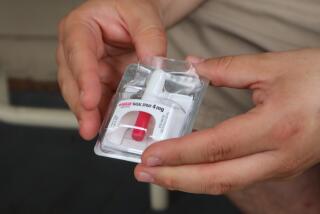Bill would regulate âbiosimilarâ drugs
SACRAMENTO â Two of the nationâs largest biotech companies â Amgen Inc. of Thousand Oaks and Genentech Inc. of South San Francisco â are fighting in Sacramento to keep a tight grip on some of their most lucrative drugs.
At stake is a potential market worth tens of billions of dollars for pricey biological medicines they make from human blood, serums, bacterial cultures, viruses and other microorganisms. They are used to treat cancers, immune disorders and many other complex diseases.
But now other drug manufacturers want to make and sell âbiosimilars.â These are drugs that would be similar to biological medicines but not identical like generic drugs. These biosimilar drugs would have to be certified by the U.S. Food and Drug Administration as âinterchangeableâ substitutes. The FDA has not yet spelled out how this would work.
On Monday, the Senate Appropriations Committee will get a taste of the biosimilar debate. It will consider SB 598, a bill by Sen. Jerry Hill (D-San Mateo) to regulate the use of these injectable, biosimilar drugs. His legislation would enable doctors to restrict the use of biosimilars and require pharmacists to keep records of their dispensing.
Hill said itâs a matter of drug safety. âSB 598 allows pharmacists to automatically substitute lower-cost biosimilar medications so patients can save money,â he said. âThe bill also ensures that doctors of seriously ill patients are notified if the medication is switched so the physician knows what drug their patient is taking.â
Backers include some drug makers and some patient advocacy groups, doctors and high-tech companies.
Opponents say the bill would establish little more than a set of roadblocks to keep cheaper substitutes off the market in California. Regulation, they contend, should be left to the FDA. Opponents include drug firms that might make biosimilars and pharmacies â as well as health insurers. Unions are on both sides of the issue.
What the bill really does is help a major employer in Hillâs legislative district â Genentech, a unit of Swiss drug giant Roche Holding, said Brynna Clark, senior director for state affairs at the Generic Pharmaceutical Assn. It seeks to fend off potential competition, she said. âItâs about market share and patent protection.â
Trade tax break
The Legislature could soon deliver $500 million worth of tax breaks for importers and exporters that boost their spending at Californiaâs seaports and airports.
A bill by Assemblyman Travis Allen (R-Huntington Beach) would provide incentives of $100 million a year for five years to importers and exporters that hire more workers, move more cargo or upgrade terminals.
The proposal has encountered no organized opposition. The Assembly economic development committee approved it in a bipartisan 8-0 vote, and it comes before the Revenue and Tax Committee on Monday. âCalifornia needs to invest in its international trade strategy and infrastructure now,â Allen said, âto ensure that we continue to be a world leader in trade.â
More to Read
Inside the business of entertainment
The Wide Shot brings you news, analysis and insights on everything from streaming wars to production â and what it all means for the future.
You may occasionally receive promotional content from the Los Angeles Times.











